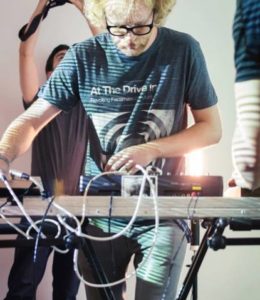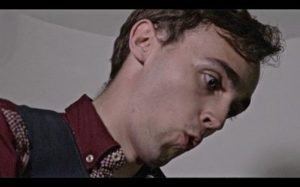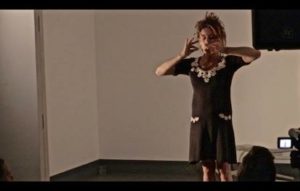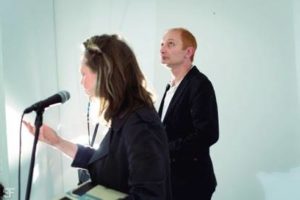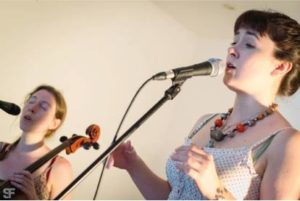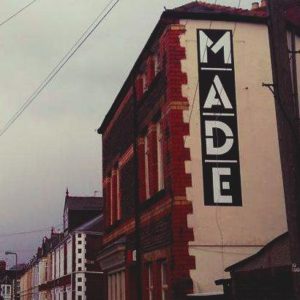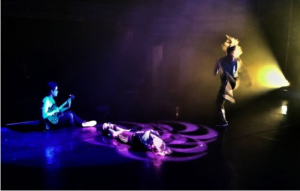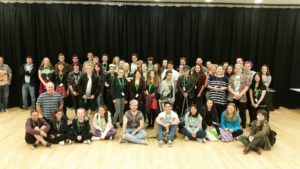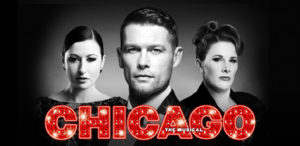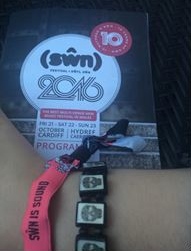
 (4 / 5)
(4 / 5)
I can usually be found at one venue or another on Cardiff’s Womaby Street most weekends, so when Sŵn Fest time rolls around it can feel akin to a party in your own living room… only with more bunting, balloons, and bands of course. This is just one key element to Sŵn’s enduring success; the sense of community between organisers, venues, acts and fans alike. Whether you’ve travelled from far and wide or you live ten minutes away like I do, everyone’s there for the same reason – to discover the most exciting up-and-coming bands and artists, filling Cardiff’s best-loved intimate venues with a welcoming and buoyant atmosphere. 2016 sees the festival reach double figures, and I was lucky enough to join the party and celebrate as Sŵn turned ten years old!
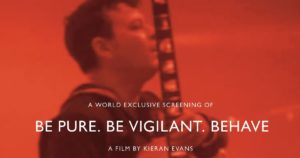
This year, Sŵn Festival begins early for me. On Wednesday, 19th October Pembrokeshire-born filmmaker Kieran Evans brought ‘Be Pure. Be Vigilant. Behave.’ to Cardiff’s Premiere Cinema for its global premiere. As a dyed-in-the-wool Manic Street Preachers fan, a one-off screening (for now, at least) of any of Evans’ work with the band, complete with a Q&A hosted by the inimitable Simon Price, is not to be missed. The film, shot during several dates of the Manics’ 20th anniversary tour of their groundbreaking 1994 album The Holy Bible, is as uncompromising and unrelenting as the record itself. Evans had pre-warned me in a short Twitter exchange that “there will be strobing…”, but after attending two dates on the THB20 tour myself, I knew that would only serve to make it a true account of the gigs; I was seeing black spots in front of my eyes for days afterwards. Evans’ focus on the fans, as much as the band, throughout the film illustrates the impact the album continues to have on its audience – not one face is captured missing a lyric, nor a word of the excerpts that have come to be such a distinctive feature of the record. They sing every song back to the band, their eyes never flickering away from the stage, with, dare I say, even more conviction and fervour than James Dean Bradfield himself.
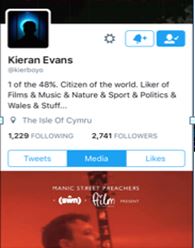
After the “visual and sonic assault on the senses”, as Evans’ describes the film, we are treated to a Q&A session where he reveals he is working on a “more personal” documentary with the Manics, provisionally titled ‘Escape From History’, to follow on from the more fact-based ‘Freed From Memories’ film that was included in the 20th anniversary boxset edition of Everything Must Go. This time, Evans says, there will be more focus on how the three remaining band members coped with the disappearance of their long-time best friend and fourth Manic Street Preacher, Richey Edwards, in February 1995, the difficult question of if and how to carry on as a band, and the resulting album Everything Must Go. Evans also deals with pleas from audience members for ‘Be Pure. Be Vigilant. Behave.’ to get a DVD release or other screenings around the country, mostly passed on by other fans that were unable to make it to Cardiff. While he makes no promises, particularly as “DVDs don’t sell anymore”, I think it would be a real shame for Manics fans across the world not to have the opportunity to see the live expression of an album we all hold so dear. Evans also reveals how the film’s title was settled upon, in keeping with the tradition of naming his album-based works with the band after lyrics from their songs (see: ‘Culture, Alienation, Boredom and Despair’ and the aforementioned ‘Freed From Memories’). During discussions with the band’s bassist Nicky Wire, the idea of ‘Suntan and Napalm’ from “ifwhiteamericatoldthetruthforonedayitsworldwouldfallapart” was suggested and so, less seriously but perhaps just as fittingly, was ‘Sterilise Rapists’ from “Archives Of Pain”. Joking aside, Evans’ assertion that The Holy Bible is “a cultural statement unlike any other” is a description truly befitting of the Manics’ masterpiece and how vital it evidently remains more than twenty years on.
A couple of days later on Saturday afternoon, I collect my press pass from the warm and welcoming volunteers at the Castle Emporium and set off to find my new favourite bands. Unfortunately, I don’t get a chance to explore the Music Museum – a joint venture between Swn and Cardiff University – in the Castle Arcade over the weekend but having been told it will be open until mid-November, I’ll definitely be whiling away a couple of hours there sometime in the coming weeks!

My first port of call from the wristband exchange is the BBC Gorwelion/Horizons stage, housed upstairs in O’Neills, to see North Walian four-piece Fleur De Lys. Their brand of indie rock comes complete with non-stop catchy hooks and striking Welsh language vocals, while the sense of joyful abandon inherent in their live shows makes them an unforgettable first find of the weekend.

My obsessive habit of arriving early for gigs pays off in style when I get to Clwb Ifor Bach half an hour early for Matt Hitt’s Drowners. I squeeze into the very back of the packed-out downstairs room to catch a few songs from Bryde, and I’m immediately glad I did. Moving seamlessly between powerful chords and gentler melodies, and with a voice that is equal parts PJ Harvey and Stevie Nicks, I’d like to think it was meant to be that I stumbled upon Bryde’s performance as I haven’t been able to stop listening to her music in the days since. Bryde plays Clwb Ifor Bach again on 2nd November for Swn’s Hair Of The Dog That Bit You gig, a “one-off post-Swn new-band-chaser” that is not to be missed.
Dashing upstairs to join the already sizeable crowd collecting for Drowners, I don’t have to wait long before the band grace the stage exuding New York cool. Expecting an aloof, detached performance I’m pleasantly surprised to see a band who unashamedly look like they’re having a great time, and promptly check my preconceptions where I stand. I’d been sold on seeing Drowners after learning that frontman Matt Hitt was a Rhondda boy and that the band were named after Suede’s debut single – a surefire winner with me. But although their name might come from Brett Anderson’s boys, their sound is more akin to The Smiths and The Cure mixed with more modern indie flavours like The Walkmen and We Are Scientists, destined to fill indie disco dancefloors here and across the Atlantic.

As I wind my way back downstairs, the growing audience for Shells catches my attention, and my decision to join them turns out to be an excellent one. Distinctive vocals on a bed of dreamy melodies helps the captivating delivery of her songs stick in your mind long after the performance, and it’s little wonder she drew such a big crowd at one of the busiest periods of the day, surely leaving everyone who saw her enraptured.
After catching up with friends at a nearby bar and sharing all the tips we have for who to try and catch tomorrow, we cross to the other side of Womanby Street to The Moon Club and we’re lucky enough to get there before they are forced to employ a one-in-one-out policy, evidence of the venue’s popularity and stellar line-up of acts. As we thunder upstairs, I’m unable to hide my excitement that I’m finally getting to see Mclusky* live! After being a fan for a mere twelve years, they don’t disappoint and are an obvious highlight of the whole festival for me. I’ll treasure the memory of being part of a packed-to-the-rafters crowd, screaming along to every witty, clever lyric that I never really thought I’d get to hear anywhere else than through my headphones sat on the X4 bus.

Post-Mclusky*, I escape the sweatbox that The Moon Club has fast become and get my breath back on my way to O’Neills for Tibet who are closing the Gorwelion/Horizons stage. It’s the perfect finish to the night with Tibet’s energetic indie pop sounding bolder than ever, and there’s a belief shared between everyone I speak to that the band will be playing on bigger stages and to bigger crowds in no time at all.

My first visit on the Sunday afternoon is to see Cardiff’s own Winter Coat who are declaring the Girl In A Band stage at Clwb Ifor Bach open. Carving their own niche in the dream pop genre, Winter Coat strike a wistful note between melancholy and careful optimism, and are the perfect antidote to the chilly October air with their melodies evoking a fresh, Spring-like feeling.

Winning the award for Best Band Name of the weekend (against fierce competition from Strong Asian Mothers and Scott And Charlene’s Wedding) are Have You Ever Seen The Jane Fonda Aerobic VHS? One of my favourites of this year’s festival, HYESTJFAV (because I can’t keep typing that out!) have come all the way from Finland to fill the top floor of Clwb with their synth-laden garage rock. Running from 60s girl group melodies to 80s electro-pop and back again, HYESTJFAV continue the rich tradition of wonderfully alternative bands from Scandinavia and I, for one, can’t wait to hear what they’ll do next.

Another big draw to The Moon Club comes in the form of Let’s Eat Grandma, a teenage girl duo from Norfolk who I’m highly excited to see as I’ve heard so many plaudits thrown their way already. Hearing their darkly ethereal alternative pop, with influences far beyond their years, leaves me in no doubt that the praise is completely warranted. Imagine if Kate Bush and Robert Smith had a child and left Nico to babysit, and you’ll be somewhere along the right track towards the thoroughly unique brilliance of Let’s Eat Grandma.

CwCw are next on my list of must-sees over at Undertone, the basement venue beneath 10 Feet Tall on nearby Church Street. Hailing from Blackwood, around eight miles from my hometown of Tredegar, I’m not about to miss the opportunity to support talent from my little neck of the woods. Formed at school (just like another Blackwood-born band I’ve previously mentioned!) if this taste of the band’s indie-folk sound is any indicator of what’s to come from them it won’t be long until their dream of being snapped up by a record label is realised. Special mention must be made to the tireless Young Promoters Network for curating such a successful stage at Undertone on the Sunday, and for slinging a free lei my way on entry!
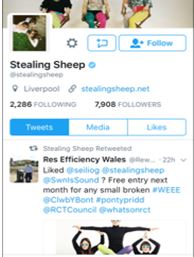
My final show of the weekend comes from Stealing Sheep, an all-girl trio from Liverpool signed to the wonderful Heavenly Records, who are appearing on the Make Noise stage upstairs in O’Neills. Doing my research beforehand, I saw the term “genre-defying” used a lot in regards to them, but I’ll give it a try… Let’s say, early-80s influenced electropop with a psychedelic edge, given an unexpectedly folk-like slant. Sort of. I’ve always admired bands that are difficult to pigeon-hole, and Stealing Sheep are no exception. With their live show full of energy and conviction, they are the ideal way for me to finally wear myself out and sign off from Swn 10.
It cannot go without saying how much work goes into making Sŵn Fest such a success, from the organisers and volunteers to the venues and the acts themselves, so a huge thank you and congratulations for a thoroughly enjoyable weekend has to go out to everyone involved! As someone who is constantly looking to discover new music, the weirder and more wonderful the better, Sŵn is continuing to prove itself unparalleled in offering fans of just about any genre the opportunity to enjoy the best venues in Cardiff and uncover the next big things!
www.facebook.com/emilyjay89
@emilyjaywrites
emilyjaywrites.wordpress.com


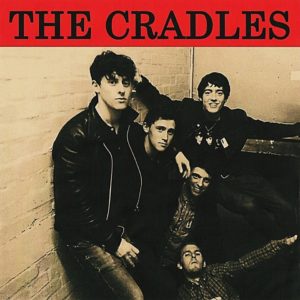

 (4 / 5)
(4 / 5)










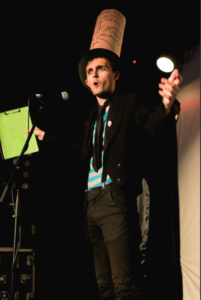
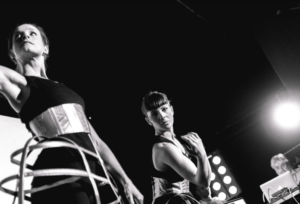
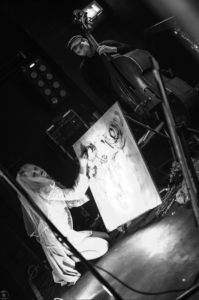
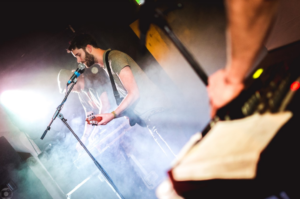

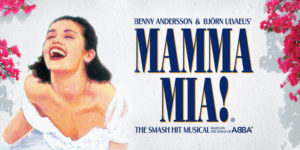

 (5 / 5)
(5 / 5)

